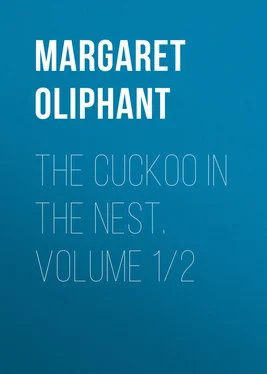Margaret Oliphant - The Cuckoo in the Nest. Volume 1/2
Здесь есть возможность читать онлайн «Margaret Oliphant - The Cuckoo in the Nest. Volume 1/2» — ознакомительный отрывок электронной книги совершенно бесплатно, а после прочтения отрывка купить полную версию. В некоторых случаях можно слушать аудио, скачать через торрент в формате fb2 и присутствует краткое содержание. ISBN: , Жанр: foreign_language, foreign_prose, на английском языке. Описание произведения, (предисловие) а так же отзывы посетителей доступны на портале библиотеки ЛибКат.
- Название:The Cuckoo in the Nest. Volume 1/2
- Автор:
- Жанр:
- Год:неизвестен
- ISBN:http://www.gutenberg.org/ebooks/52575
- Рейтинг книги:5 / 5. Голосов: 1
-
Избранное:Добавить в избранное
- Отзывы:
-
Ваша оценка:
- 100
- 1
- 2
- 3
- 4
- 5
The Cuckoo in the Nest. Volume 1/2: краткое содержание, описание и аннотация
Предлагаем к чтению аннотацию, описание, краткое содержание или предисловие (зависит от того, что написал сам автор книги «The Cuckoo in the Nest. Volume 1/2»). Если вы не нашли необходимую информацию о книге — напишите в комментариях, мы постараемся отыскать её.
The Cuckoo in the Nest. Volume 1/2 — читать онлайн ознакомительный отрывок
Ниже представлен текст книги, разбитый по страницам. Система сохранения места последней прочитанной страницы, позволяет с удобством читать онлайн бесплатно книгу «The Cuckoo in the Nest. Volume 1/2», без необходимости каждый раз заново искать на чём Вы остановились. Поставьте закладку, и сможете в любой момент перейти на страницу, на которой закончили чтение.
Интервал:
Закладка:
If Gervase walked with a wavering gait, it was not because of the beer against which Patty had made so strong a remonstrance. He had, indeed, had quite enough of that; but his uncertain step was natural to the Softy, as all the country called him. He went along with his head stooping, his hands in his pockets, his eyes traversing the path as well as his feet, keeping up an inane calculation of the white pebbles, or the brown ones, among the gravel. He had long been in the habit of playing a sort of game with himself in the vacancy of his mind, the brown against the white, counting them all along the level of the road, occasionally cheating himself in the interests of the right side or the left. This occupation had beguiled him over many a mile of road. But it had palled upon him since he had known Patty, or rather, since she had surprised him into that admiration and enthusiasm which had made him determine to marry her, whatever difficulties might be in the way. It was, perhaps, because of the rebuff she had given him that Gervase had again taken to his game with the brown and white pebbles in the road, which, indeed, it was not too easy to distinguish in the whiteness of the moon. He walked along with his head down, his hands in his pockets, his shoulders up to his ears, and the moon was very unhandsome in the matter of shadow, and threw a villainous blotch behind him upon that clear white line of way. There was a light in the front of the house to which Gervase was bound; a sort of querulous light, which shone keen in the expanse of windows, all black and white in the moon, like the eyes of an angry watcher looking out for the return of the prodigal, but not like the father in the parable. It was, indeed, exactly so: the light was in his mother’s window, who would not go to bed till Gervase had come home. It was not late, but it was late for the rural household, which was all closed and shut up by ten o’clock. Sir Giles was an invalid, his wife old, and accustomed to take great care of herself. She sat up in her dressing-gown, angry, though anxious, with all the reproachful dignity of a woman kept up and deprived of her natural rest, ready to step into bed the moment her vigil was over; a large watch ticking noisily and also reproachfully on the table beside her, with a sort of stare in its large white face, seeming to say, late! late! instead of tick, tick – to the young man’s guilty ear.
At least, it had once done so; but Gervase by this time was quite hardened to the watch that said late! and the mother whose tongue in the tschick, tschick! of angry remonstrance, hailed him for want of better welcome when he went in.
He directed himself to a little side door in the shadow, which was often left open for him by the old butler, who had less fear of his plate than of getting the boy, whom, Softy as he was, he loved, into trouble. But sometimes it was not left open; sometimes an emissary from above, his mother’s maid, who loved him not, one of her satellites, turned the key, and Gervase had to ring, waking all the echoes of the house. He thought it was going to be so on this particular night, for when he pushed, it did not yield. Next moment, however, it opened softly, showing a tall shadow in the dimly-lighted passage. “O, Gervase, how late you are!” said a low voice.
“Why, it’s you!” he said.
“Yes, it’s me. My aunt is angry, I don’t know why. And she says you are to go to her before you go to bed.”
“I sha’n’t!” said Gervase.
“Do, there’s a dear boy. She has got something in her head. She will imagine worse than the truth if you don’t go. Oh! why should you be so undutiful? They would be so good to you if you would but let them. Go to your mother, Gervase, and let her see – ”
She paused, looking at him by the faint light as if she were not very sure that Gervase’s mother would see anything satisfactory. There was not, indeed, anything exhilarating to see. His light eyes, which had shone with a certain brightness upon Patty, were opaque now, and had no speculation in them. His under lip hung a little, and was always moist. The sullen look was habitual to his face. “What does she want o’ me?” he said in his throat, running his words into each other.
“She wants of you – what I’m afraid she’ll never get,” said the cousin with a tone of exasperation; “but at least go and say good-night to her, Gervase, and be as pleasant as you can. You may always do that.”
“You’re not one that thinks much o’ my pleasantness, Meg.”
“I’ve always been grateful for it when you’ve showed me any,” she said with a smile. She was a tall woman, older than Gervase, a few years over thirty, at the age which should be the very glory and flush of prime, but which in a woman is usually scoffed at as if it were old age. Gervase frankly thought his cousin an elderly woman who did not count any longer in life. She was very plainly dressed in black, being a widow and poor, and had something of the air of one who is on sufferance in a house to which she does not naturally belong. She kept at a slight distance from her cousin, taking half a step back when he took one in advance: but her voice to him was soft and her meaning kind. She had no great affection, beyond the habitual bond of having known him all his life, for Gervase; but she was a bystander seeing both sides of the question, and she did not think that the treatment adopted in his home was judicious, which made her more or less, as a dependent may be, the partizan of the poor fellow, for whom nobody had any respect, and few people cared at all.
“Come,” she said, in a persuasive tone; “I’ll go with you, Gervase.”
“What good’ll that do?” he said, sullenly.
“Well, not much, perhaps: but you always liked when you were little to have somebody to stand by you: and if my aunt thinks I’m intruding, it will be all the better for you.”
So saying, she led the way upstairs, and knocked lightly at a door on the gallery which went round the hall. “Here he is, aunt,” she said, “quite safe and sound; and now you can get to bed.”
“Who is quite safe and sound? and was there any doubt on that subject?” said a voice within. Lady Piercey sat very upright in an old-fashioned chair of the square high-backed kind, with walls like a house. The candle that looked so querulous in the window had inside a sharp, self-assertive light, as if it had known all about it all the time. She was in a dressing-gown of a large shawl pattern, warm and wadded, and had a muslin cap with goffered frills tied closely round her face. It is a kind of head-dress which makes a benign face still more benign, and a sweet complexion sweeter, and which also stiffens and starches a different kind of countenance. Lady Piercey was high featured, of that type of the human visage which resembles a horse, and her frills quivered with the indignation in her soul.
“I thought you were anxious about Gervase, aunt.”
Mrs. Osborne interfered in this obviously injudicious way, with the object of drawing aside the lightnings upon herself, as it was generally easy to do.
“I don’t know what you had to do with it,” said Lady Piercey, roughly. “If I’m anxious about Gervase, it’s not about life or limb. I’m not a fool, I hope. What did you give her, you block, to make her come and put herself before you like this?”
“I’ve got nothing to give,” said the lout. There had been a trace of manhood, a gleam even of the gentleman in him when he was with Patty. Here, in his mother’s room, he became a mere lump of clay. He pulled out his pockets as he spoke, which shed a number of small articles upon the floor, but not a coin. “I have a deal to give – to her or any one,” he said.
“Where do you spend it all?” said the mother; “five shillings I gave you on Monday, and what expenses have you? Kept in luxury, and never needing to put your hand in your pocket. Goodness, Meg, what a smell! Is it a barrel of beer you’ve rolled into my room, or is it – is it my only boy?”
Читать дальшеИнтервал:
Закладка:
Похожие книги на «The Cuckoo in the Nest. Volume 1/2»
Представляем Вашему вниманию похожие книги на «The Cuckoo in the Nest. Volume 1/2» списком для выбора. Мы отобрали схожую по названию и смыслу литературу в надежде предоставить читателям больше вариантов отыскать новые, интересные, ещё непрочитанные произведения.
Обсуждение, отзывы о книге «The Cuckoo in the Nest. Volume 1/2» и просто собственные мнения читателей. Оставьте ваши комментарии, напишите, что Вы думаете о произведении, его смысле или главных героях. Укажите что конкретно понравилось, а что нет, и почему Вы так считаете.












